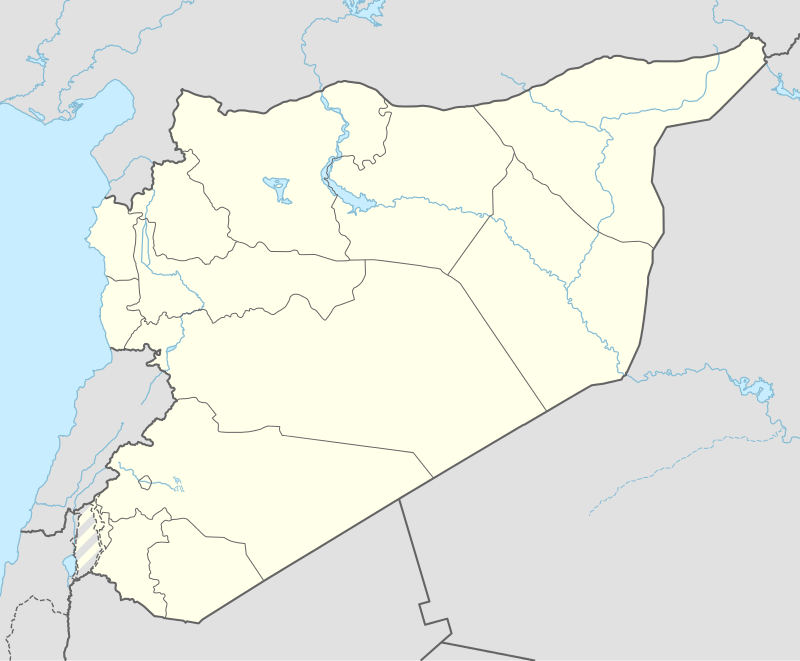Jubb'adin
| Jubb'adin ܓܦܥܘܕ - גפעוד جبعدين Ġuppaҁōḏ | |
|---|---|
| Village | |
 Jubb'adin | |
| Coordinates: 33°49′35″N 36°30′33″E / 33.826382°N 36.509215°ECoordinates: 33°49′35″N 36°30′33″E / 33.826382°N 36.509215°E | |
| Country |
|
| Governorate | Rif Dimashq Governorate |
| District | Al-Qutayfah District |
| Nahiyah | Maaloula |
| Population (2004 census)[1] | |
| • Total | 3,778 |
| Time zone | UTC+2 (EET) |
| • Summer (DST) | UTC+3 (EEST) |
| Area code(s) | 11 |
Jubb'adin or Ġuppaҁōḏ (Arabic: جبعدين, Aramaic: ܓܦܥܘܕ - גפעוד)[2] is a village in southern Syria, administratively part of the Rif Dimashq Governorate, located northeast of Damascus in the Qalamun Mountains. Nearby localities include Saidnaya and Rankous to the southwest, Yabroud and Maaloula to the northeast, and Assal al-Ward to the northwest. According to the Syria Central Bureau of Statistics, Jubb'adin had a population of 3,778 in the 2004 census.[1] However, that number has likely decreased during the Syrian Civil War as a result of combat casualties and emigration of young men out of the village to avoid military drafting. In 2013, the village was bombarded multiple times by the Syrian Armed Forces.
The village is among the three last remaining villages where Western Neo-Aramaic is still spoken. Most of the younger people in the village are bilingual and speak both Western Neo-Aramaic and Syrian Arabic fluently. The etymology of the village's name remains controversial. It is believed to be composed of two parts. The first part is Ġuppa (Aramaic: ܓܽܦܐ), which is Aramaic for 'well' and second part is ҁōḏ (Aramaic: ܥܘܕ), which has several possible meanings. ҁōḏ (Aramaic: ܥܘܕ) could mean 'feast', making the full meaning as 'the well of the feast'. Another possibility is that it is a reference to Audis who founded Audianism prior to the advent of Islam, in which case the full meaning would be 'the well of Audius'. Another theory, though less likely, is that the word is a reference to the people of ‘Ad, who are mentioned in the Quran. Today, the village's inhabitants are predominantly Sunni Muslims. The main mosque in the village is called Jemҁa rāb or 'The large mosque' in Aramaic. Historically, most of the inhabitants were farmers but nowadays there is a much larger diversity of occupations. Jubb'adin is main source for modern poetry written in the Western Neo-Aramaic language thanks to its many poets. The environment is colder than most other Syrian cities and villages due to its altitude.[3] Famous individuals from the village include the Syrian actor Jalal Al-Taweel.
References
- 1 2 General Census of Population and Housing 2004. Syria Central Bureau of Statistics (CBS). Rif Dimashq Governorate. (in Arabic)
- ↑ AntonSamuel (11 September 2017). "English: Maaloula 7". Commons.wikimedia.org. Retrieved 3 December 2017.
- ↑ Amar, Joseph (12 October 2012). "The Loss of Syria". Commonwealmagazine.org. Retrieved 22 December 2012.
- Samples of spoken Jubb'adin Aramaic at the Semitisches Tonarchiv (Semitic Audio Archive)
